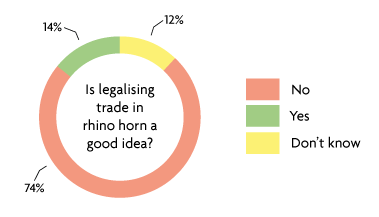In April this year, a leaked document (now available on the CITES website) sent from the CITES Management Authority of Swaziland to the Convention on International Trade in Endangered Species (CITES) showed a proposal to “permit a limited and regulated trade in white rhino horn” whereby Swaziland would sell their confiscated stores of rhino horn, all 330kg of it, over a number of years whilst also harvesting an additional volume of horn through “non-lethal” methods in order to pay for protection of the 73 white rhinos that remain in the country. The Swaziland authorities estimated that the sale of the stocks would generate $9.9 million at a price of $30,000 per kg.
Citing increasing financial pressure, driven by demand from Asia, the authority stated that the ban on rhino horn trade is “clearly not working” and that the revenue from its legal sale would bolster their ability to continue the protection of the country’s rhino stock. This includes the ability to adequately remunerate park rangers, who ”serve far beyond the call of duty to protect the country’s rhinos against ever increasing dangers”. They go on to describe how these proceeds would “ultimately benefit neighbouring communities and nature conservation initiatives”.
The Swaziland officials describe how allowing the legal trade of the horn would counter a disparity where currently “100% of the proceeds” go to the criminals and rhino custodians pay “100% of the costs of rhino protection.” Furthermore they describe how “sustainable utilization” of this kind has been proven to work in enhancing the survival chances of these species.
According to National Geographic, most major conservation organisations oppose the idea however they did highlight that this is “hotly contested”. So we asked our members whether they thought the proposal to legalise the trade was a good idea.

Overwhelmingly they said no. 74% took this position, with just 14% stating that it would be a good idea. 12% of respondents said they felt they didn’t know.
Whilst our poll has been conclusive it seems that CITES themselves haven’t taken a decision just yet. However, in neighbouring South Africa a legal battle that has been waged over the last few months has seemingly been settled after a lifting of a similar ban was overturned and a moratorium was put back in place.
Working on endangered species conservation? If you’d like to share your research, why not get in touch to talk about publishing a blog on the IES Analysis pages.



